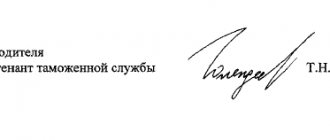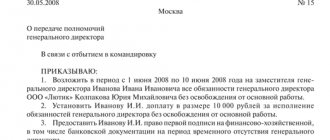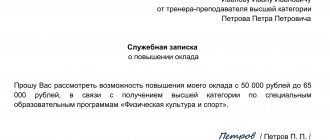Temporary performance of duties: legal basis
Art.
60.2 of the Labor Code of the Russian Federation regulates that in order to fulfill the duties of a temporarily absent employee, another employee of the organization may be entrusted with additional work without being released from his main work, as defined by the employment contract. As you can see, this norm does not disclose the concepts of “acting duties” and “temporarily performing duties,” but establishes the order in which additional official duties can be assigned to an employee without changing his position. Namely:
- The timing, volume and content of additional work assigned to an employee in connection with the temporary absence of another employee are determined by the employer with the written consent of the employee on whom such obligations are supposed to be assigned.
- The employee has the right at any time to refuse to fulfill the additional obligations assigned to him, just as the employer can cancel this order. In this case, the party that made the corresponding decision must notify the other party to the employment contract in writing about this at least 3 days in advance.
If the parties to the employment contract have reached an agreement on this issue, the employer issues a corresponding order to assign responsibilities (or temporarily assign responsibilities) to a specific employee. Typically, such an order also indicates the deadline for the employee to perform additional work. For example: “for the period of absence of the main employee”, “for the period of the main employee’s stay on a business trip”, “for the period of the main employee’s stay on sick leave”, etc.
We discussed the subtleties of preparing the necessary documentation in another article - “Drawing up an order to combine positions - sample”, we recommend reading it.
ConsultantPlus tells us how to arrange and pay an employee for temporary performance of duties. If you do not yet have access to the ConsultantPlus system, you can obtain it free of charge for 2 days.
I.o., or How to properly replace an employee
Sometimes on documents you can see the signature not of the head of the company, but of the person performing his duties, which in most cases is precisely indicated: “and.
O. director" or "i. O. chief accountant." Is such a position in accordance with the law? Is it legal to indicate “and” when signing documents? O."? You will find answers to these and some other questions by reading the article. Let’s imagine a situation where the head of a company quits and a replacement has not yet been found. But the position of a manager cannot be empty - someone must manage the company. Typically, in this case, the deputy is appointed acting manager and is limited to that. But is this right? Let's figure it out.
Fulfilling the duties of an absent employee
Article 60.2 of the Labor Code of the Russian Federation provides for the possibility of fulfilling the duties of a temporarily absent employee without release from work specified in the employment contract. To do this, the employee is entrusted with performing, during the established duration of the working day (shift), along with the work specified in the employment contract, additional work in a different or the same profession (position) for additional pay. Please note that this can only be done with the written consent of the employee.
Additional work assigned to an employee in another profession (position) can be carried out by combining professions (positions). If additional work is of the same profession (position), it can be carried out by expanding service areas or increasing the volume of work. The period during which the employee will perform additional work, its content and volume are established by the employer with the written consent of the employee.
The employee has the right to refuse to perform additional work ahead of schedule, and the employer has the right to cancel the order to perform it ahead of schedule, notifying the other party in writing no later than three working days in advance. To assign the duties of an absent employee, it is necessary to conclude an additional agreement, which clearly indicates the job responsibilities that the employee is entrusted with. In addition, the agreement must specify the amount of additional payment for the performance of duties, the period and other conditions agreed upon by the parties to the employment relationship.
To perform the duties of a temporarily absent employee without release from work specified in the employment contract, the employee may be assigned additional work in either a different or the same profession (position).
There is an important point in applying the norm of Art. 60.2 of the Labor Code of the Russian Federation : the appointment of an employee as acting for a vacant position is not allowed. This is possible only for a position, the appointment to which is made by a higher management body. In this case, the head of the enterprise, institution, or organization is obliged, no later than one month from the date of hiring the worker, to submit documents to the higher management body for his appointment to the position. This body, within a month from the date of receipt of the documents, must consider the issue and inform the manager about the results ( clause 2 of the Explanation of the State Committee for Labor of the USSR No. 30 and the Secretariat of the All-Union Central Council of Trade Unions No. 39 of December 29, 1965 No. 30/39 “On the procedure for paying for temporary substitution” [1] ( further – Explanation)).
Of course, if it is necessary to fulfill the duties of an absent employee, you can be guided not only by the named article of the Labor Code. You can also apply:
- Art. 72.2 and make the transfer. In this case, the employee is released from performing his job duties and is engaged only in the work of the absent employee. The period of transfer to replace a temporarily absent employee is not limited. If the place where the employee is planned to be transferred is vacant, then the transfer can be carried out either on a temporary basis (for a period of no more than a year) or on a permanent basis (if the employer believes that the employee will cope with the work in the new position). Please note that such a transfer is possible only with the consent of the employee;
- Art. 72.1 and carry out the movement. If an employee moves to another workplace, to another structural unit located in the same area, or is entrusted with work on another mechanism or unit and this does not entail a change in the terms of the employment contract determined by the parties, the employee’s consent is not required . When moving, the employer does not have the right to require the employee to perform work duties in two positions;
- Art. 59 and conclude a fixed-term employment contract to perform the duties of an absent employee, who, in accordance with labor legislation and other regulatory legal acts containing labor law norms, a collective agreement, agreements, local regulations, and an employment contract, retains his place of work. If the position for which you need to perform the duties is vacant, you can conclude an open-ended employment contract, observing the requirements of Section. III “Employment contract” of the Labor Code of the Russian Federation.
Is it necessary to formalize the performance of the duties of a manager if the employee who will perform them has such a clause in his job description?
Yes, it is necessary, and here's why. According to the Explanation, the temporary performance of duties in the position of an absent employee is assigned to another employee by order (instruction) of the enterprise, institution or organization. Similar requirements are contained in the Labor Code.
A job description is a local regulatory legal act that defines the functions (responsibilities), rights and responsibilities of an employee holding a certain position. If it includes a condition for replacing the manager, this means that the employee is obliged to replace the manager only when the latter goes on vacation, goes on a business trip, gets sick or is absent for other reasons.
In order for the condition on the performance of the duties of the manager to take effect, it is necessary to issue an order in which to record the fact of the absence of the manager and the assignment of his duties to a specific employee, as well as to determine the period of replacement and additional payment for it.
Please note that in this case it is not necessary to conclude an additional agreement to the employment contract.
Should we conclude with an employee who is not a full-time deputy director an additional agreement to the employment contract on the temporary performance of his duties?
Yes, they should, and the need to draw up an additional agreement does not depend on the method of formalizing the temporary performance of the manager’s duties. If the employee is not released from his work, the performance of duties can be entrusted to him only with written consent, by concluding an additional agreement to the employment contract ( Article 60.2 of the Labor Code of the Russian Federation ). If a temporary transfer is used to perform duties and the employee is released from performing his work, it is also necessary to draw up an additional agreement ( Article 72.2 of the Labor Code of the Russian Federation ). Note that in neither case is an entry in the work book made.
Does the acting head of a company have the right to hire and fire employees?
When an employee is appointed as an acting manager, the additional agreement to the employment contract usually specifies the functions that he can perform instead of the manager. Thus, he can hire and fire workers if the agreement grants him the appropriate powers.
How should the acting official sign documents? Is the following entry legal: “i. O. director"?
Indeed, often in cases where the position and surname of the director are entered into the unified order form, the acting director writes “acting” before the name of the position. O." and puts his signature. And sometimes those performing duties put a slash before their signature. This is fundamentally wrong.
Based on clause 3.22 of GOST R 6.30-2003 “Unified documentation systems. Unified system of organizational and administrative documentation. Requirements for the preparation of documents” [2] the “Signature” requisite includes: the title of the position of the person who signed the document, personal signature and its decoding (initials, surname).
Since the position “acting” does not exist, the employee who is entrusted with performing the duties of a manager, when signing the document, must indicate the position that he occupies according to the staffing table. You should not be afraid of this, because the relevant powers have been officially delegated to him (by order, additional agreement, power of attorney).
For how long can an acting officer be appointed?
There are no regulatory documents limiting the length of time an employee can perform his duties as a manager, so he can work like this for as long as the employer needs.
How to appoint an acting director if the director unexpectedly falls ill and cannot issue an order to appoint an acting director?
In this case, the issue of appointing an acting director of the company should be decided by the company's participants. If there is only one participant, good, the issue will be resolved quickly enough, since it is he who will appoint an acting director for the period of his temporary incapacity. But if there are more participants in the company, the resolution of this issue may be delayed, because it is necessary to hold an extraordinary meeting of participants. Let us remind you that the procedure for holding an extraordinary meeting of participants is established by federal laws dated December 26, 1995 No. 208-FZ “On Joint-Stock Companies” and dated February 8, 1998 No. 14-FZ “On Limited Liability Companies” ; it can take a long time.
Our manager is going on a long business trip. We would like to appoint the head of the legal department to act as his responsibilities. Can we transfer only part of the director's duties to him? How to formalize such a transfer of authority?
In most cases, the procedure for replacing the head of the company is prescribed in the charter and the condition for replacing the head is included in the employment contract and job description of the employee who will perform the duties of the head during his absence. If the replacement procedure is not specified in the charter, a separate order is issued. It must indicate exactly what powers are being transferred, for example the right to sign financial documents, employment contracts, financial statements, and the period for which they are transferred.
To formalize the performance of duties, it is necessary to conclude an additional agreement to the employment contract and issue an order. In addition, during the absence of the head of the organization, it is necessary to issue a power of attorney indicating the powers delegated to the head of the legal department.
Let us remind you that, by virtue of Art. 185 of the Civil Code of the Russian Federation, a power of attorney is understood as a written authority issued by one person to another person for representation before third parties. A power of attorney is issued for a period of no more than three years, and if the period is not specified, it is valid for one year from the date of issue. The person who issued the power of attorney may revoke it at any time.
So, if you want the head of the legal department to perform only part of the functions of a manager, fix them in an order and an additional agreement. Otherwise, he will perform those functions that are defined for the head by the organization’s charter and the legislation of the Russian Federation.
[1] Applicable to the extent that does not contradict the Labor Code (Article 423 of the Labor Code of the Russian Federation). [2] Put into effect by Decree of the State Standard of the Russian Federation dated 03.03.2003 No. 65-Art.
Source of the article: https://www.klerk.ru/law/articles/265514/
What is the difference between acting and interim
Thus, the law provides for the possibility of temporary combination of positions, which in its legal essence is the performance of the duties of another employee by one of the employees during the absence of the first one.
However, the legislation does not contain such terms as “acting” or “acting manager”, so it is not possible to establish differences between these definitions from a legal point of view.
Considering the practice of using these terms, we can conclude that from a legal point of view, these definitions are identical: in both situations it is assumed that a certain employee performs the duties of another only temporarily.
From a linguistic point of view, the following semantic (i.e. semantic) differences can be identified:
- The term "temporary" in practice is usually used in cases where it is known for what period of time a particular employee will be absent from the workplace and when the position of such employee is not vacant. For example, the head of a department goes on vacation, and an acting chief is appointed (we will tell you later how to correctly write acting in documents).
- The term “acting” is more often used in office work in situations where the position of an employee, whose duties are assigned to another employee of the same organization, is vacant and it is difficult to say with accuracy exactly when the corresponding employee will begin his work duties.
Mutual replacement of these terms is acceptable, but if local documentation (including administrative) of a particular organization uses one of them or establishes rules for the use of each, these rules should be adhered to in order to avoid possible disputes.
Conclusions TheDifference.ru
- Content. The acting acting executive exclusively performs the duties of the temporary position held by him, while the acting executive combines duties with the main position.
- Duration. The acting acting director performs duties until the departure of the main employee, and the acting executive until the appointment of a new person to the position.
- Availability of vacancy. An acting executive officer is appointed in the event that the main employee is temporarily unable to perform job duties; an acting executive officer is appointed if there is a free “chair.”
- Responsibilities. The executive officer combines a temporary position with the main responsibilities, while the acting director is transferred to a new job.
When the terms “interim” and “acting” are used
Until the right candidate for the vacant position is found (or the replacement employee is temporarily absent on the grounds provided for by law), in order to avoid downtime or disruption of the production process, you can assign the duties of the absentee to one of the other employees, but precisely in addition to his main job responsibilities.
IMPORTANT! In our article we do not consider:
- Transfer of an employee to another position under Art. 72.1 of the Labor Code of the Russian Federation (i.e. when he is completely relieved of his current job duties in his current position and he will not be acting, but will simply take a new position).
- Part-time work under Art. 282 of the Labor Code of the Russian Federation (i.e. when additional functions are performed in free time from the main job, which should not be confused with the situation when an employee, on his own initiative, works overtime without pay). Prefixes vrio and i. O. in these cases they lose their meaning.
A practical situation when acting or acting are appointed. o., usually implies combining positions, i.e. performing additional work in parallel with the main one. At the same time, in addition to the order, an additional agreement to the employment contract must also be issued (you can learn about these subtleties from our other articles, for example, “Combination and part-time work - what is the difference?”).
There is also the following decision: the employee’s job description already states that during the absence of another employee (including the immediate head of a department or organization), the first performs the duties of the second. In this case, administrative documents are not issued, the employee acts within the framework of his job description (the terms “acting” and “acting” are not used in relation to him in the document flow).
Comparison
The legal differentiation of these terms is laid down in Articles 74 and 151 of the Labor Code of the Russian Federation, and their provisions have been honed in practice. Thus, an acting acting director is appointed to a position with a release from the old one. The position he took is not vacant, so he will work until the main employee returns. The EO combines responsibilities with his main position. However, the position to which he is appointed remains vacant.
It is worth mentioning right away that the interpretation of the norms is formed by practice, and often VRIO and IO are used as synonyms. Additional payment is made in cases where the temporary position holder is not a full-time deputy of a person who cannot begin work duties. Official explanations do not in any way alleviate the severity of the problem, since they themselves are contradictory.
How to spell the abbreviation “interim chief”
Clerks often have a question: temporarily acting - what abbreviation for this phrase is possible? How to spell vrio?
We answer: from the point of view. Russian language vrio should be written in exactly this way, i.e.:
- all letters are lowercase (except when a sentence begins with this word);
- no dots between letters;
- in one word;
- without quotes.
Options "Vr. And. o.”, “VRIO”, “Vr. io" and others that do not comply with the above rules are incorrect.
Here are some examples of use:
- “The acting director of the Voronezh footwear plant reported the following information...”
- “According to the acting chief physician of the Sverdlovsk Regional Hospital...”
So, acting chief - we looked at how this abbreviation is written in this block of our article.
Let us note one more important fact: if the acting manager or other authorized official signs any documents, then it would be appropriate, when designating the position of such a person, to indicate (optional) either that this person is temporarily performing certain duties, or the name of the actual position of such person faces.
For example, Ivanov I.I., holding the position of chief manager of the sales department, was appointed by order as the acting head of this department. In this case, his signature can be formatted as follows (all options are correct):
- Acting Head of Sales Department;
- chief sales manager;
- general manager, acting head of sales department.
How is IO written in documents?
The situation is completely different with the indication of the prefix io. We answer frequently asked questions, as written io :
- with or without dots - by correctly placing a dot “i.o.” after each letter;
- in large or small letters - in a sentence all the letters are small “I.o.”, at the beginning of the sentence it begins with a capital “I.o.”
Example for the CEO:
It is also written for all managers of the organization: boss, manager, chief accountant, etc.
Other options are erroneous and should not appear in official documents. However, incorrect spelling will not entail any legal consequences.
Both prefixes, which characterize the performance of duties, are office work practices that are not enshrined in law.
Acting General Director: how to spell correctly
We have already described above how to write a temporary document. But there is another option for abbreviation, which is actively used in office work to indicate that the employee, in addition to his job duties, performs the functions of another position. Io - how to write this abbreviation correctly (and is this letter combination an abbreviation in principle)?
We compared the content of the terms “acting” and “temporarily acting” and came to the conclusion that from a legal point of view these concepts should be considered identical. Despite this, the rules for writing these abbreviations vary:
How to write vrio correctly
One word, no spaces, no punctuation.
Vrio: decoding of the acronym
This acronym, which has come into common use again, stands for Time (exactly) And (performing) O (responsibilities). The word “vrio” is not inflected and is a generic noun, that is, it can mean both a man and a woman. Accordingly, it can be consistent with other parts of speech, both masculine and feminine: new vrio, if we are talking about a man, and new vrio, if we are talking about a woman. How to write acting director? If he temporarily performs these duties, then he is acting, but what if not? Let's remove the first 2 letters.
We write correctly in the documents: acting director
Instead of the head of the organization, his duties are temporarily performed by the acting director. How to write his position correctly in documents, for example, in contracts and acceptance certificates? This is the first time a personnel officer has encountered such a situation. I would like to formalize everything without errors, especially since the procedure adopted in the organization for placing the designation “ACTIVE” in front of a position inspires doubts in the HR specialist. In the article we will demonstrate a sample of how to write “acting director” in documents.
How to write acting and acting correctly. in documents
The existing division in office work into “acting” and “acting.” very conditional. After all, in both cases the duties are performed temporarily.
However, it is generally accepted that “acting” is written before the position of the person acting as director during his vacation or illness. And to reflect the fact of an open managerial vacancy, the abbreviation “acting” is used. There are also differences in their spelling.
When temporarily transferring management functions and signing rights by the general director himself, the authorized person can use two options for signing:
- That’s how to write acting director A.B. Petrov;
- use the name of your own position - first deputy director V.G. Sidorov.
Please note that vrio is written with a small letter and without any periods between them . This option is considered the only correct one. This acronym is written with a capital letter only when it appears at the beginning of a sentence: “The Acting Reflected in his report...”
A reduction in the transfer of a leadership position before the official appointment of a new leader is a different matter. Here it is necessary to indicate the official status of the acting official. Therefore, on all documents only the name of the position being filled is used. The writing principle is also different; the abbreviation also uses small letters, but dots are placed after them: “i.o.”
Features of international correspondence
In business correspondence, the status of the employee as a temporary replacement manager is also indicated. For this, the following English expressions and their abbreviations are used:
- Officer-in-Charge of the (position name) for acting;
- Director General ad Interim or Director General ai for interim;
- acting head (job title) or simply acting as+position for acting.
We do not put an I.O, since the employee’s position does not change
So, how to abbreviate “acting director” in documents? It’s simple, you don’t need to put this designation at all. This is explained as follows. Due to the fact that the employee is entrusted with the duties of a director, his position indicated in the staffing table does not change. Therefore, when concluding contracts, the replacement director employee indicates his position. There is no need to indicate any “I.O”, “Acting”, or “Acting” when signing the contract.
Thus, the popular question: how to write in documents if the acting director is a woman does not make sense.
The current legislation does not contain any restrictions on the temporary performance of the functions of the head of an organization by any suitable employee (clause 1 of the Procedure, approved by clarification dated December 29, 1965 of the USSR State Committee for Labor No. 30 and the Secretariat of the All-Union Central Council of Trade Unions No. 39). In this case, an order is issued regarding the acting director.
Especially for readers, our specialists have prepared an example of how to write “acting director” in documents in the header:
Source of the article: https://blogkadrovika.ru/pishem-v-dokumentax-pravilno-ispolnyayushhij-obyazannosti-direktora/









